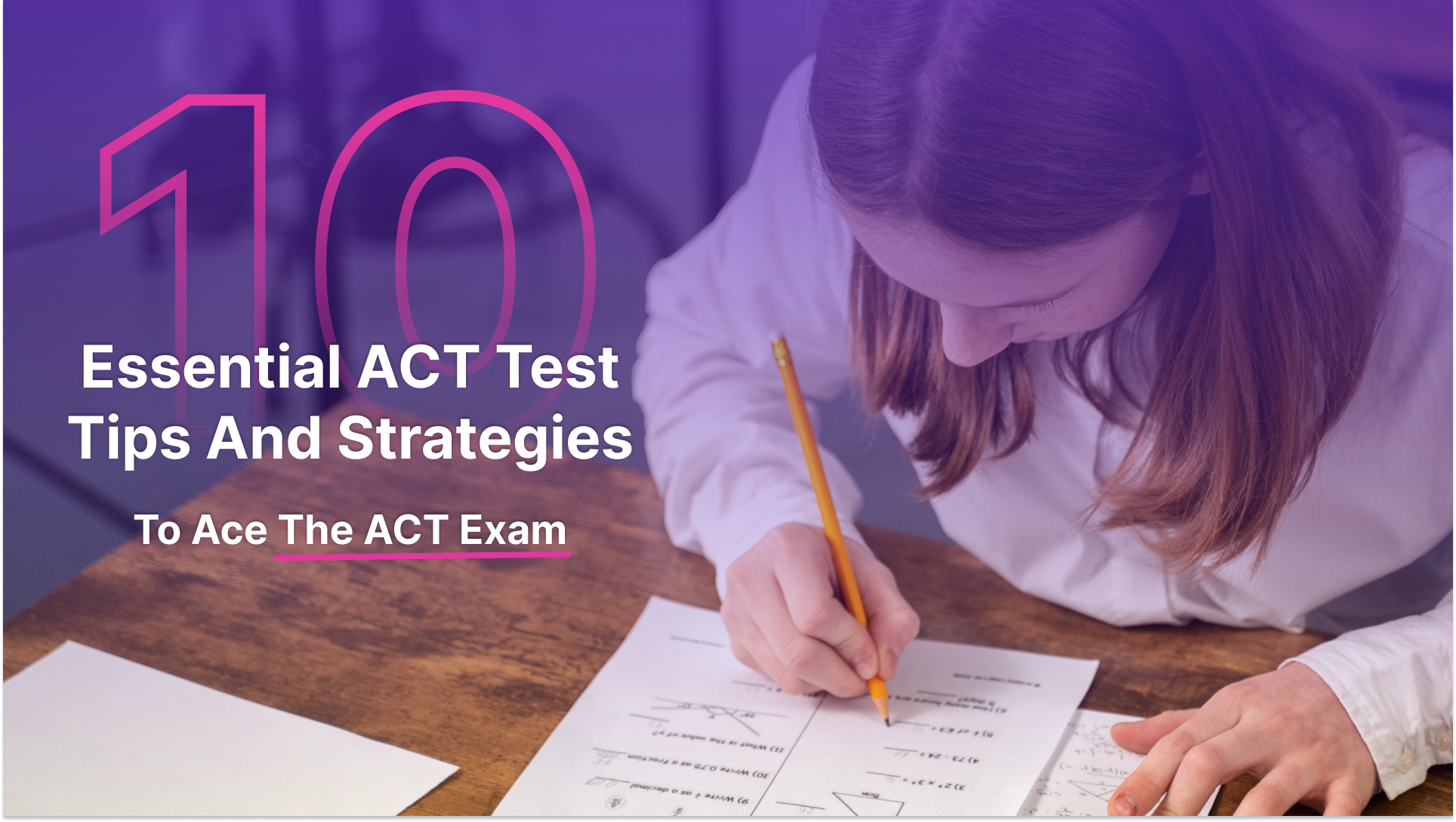Best Tips on How to Prepare Your Child for Online Tutoring
Discover how to set your child up for success with online tutoring. Get tips on finding the right tutor, tech setup, and more. Try Tutorpeers today!
Read more
As college admissions grow increasingly competitive, achieving a high score on the ACT exam has become a crucial milestone for many high school students. This standardized test, a common requirement for college applications in the United States, is a key indicator of a student's readiness for college-level coursework. However, acing the ACT is more than just a display of academic prowess; it demonstrates strategic preparation and a deep understanding of the exam's structure and demands.
But why is the ACT so important? For starters, it's often a major deciding factor in college admissions, scholarships, and placement in advanced courses. The exam evaluates a broad range of skills, from English and mathematics to reading comprehension and scientific reasoning. As a result, a high ACT score can open doors to prestigious universities and academic opportunities.
This Tutorpeers article will guide you through the most effective ACT tips and strategies. Whether you're grappling with complex algebraic problems or dense scientific passages, these insights will help you confidently navigate each section. Our goal is to equip you with the knowledge and techniques needed to not only take the ACT exam but to excel in it. So, let's dive in and explore how you can maximize your ACT performance and achieve the scores that reflect your true potential. Remember, with the right approach and preparation, acing the ACT is within your reach.

The ACT exam is more than just a test; it's a critical step in your academic journey. Designed to assess high school students' general educational development and ability to complete college-level work, the ACT is a multifaceted examination comprising four main sections: English, Mathematics, Reading, and Science, with an optional Writing section.
Understanding the structure and content of each section is crucial for effective preparation. As you delve deeper into the specifics of each part, you can tailor your study strategies to meet the unique challenges they present. A clear grasp of the ACT's layout helps strategize your study plan and manage your time during the actual exam.
The ACT exam is pivotal in shaping your academic future. Scoring well can significantly enhance your college application, making it an important goal for any college-bound student. In the following sections, we'll explore targeted strategies for each part of the ACT, ensuring that you're well-prepared to tackle each question with confidence.
The ACT English section can be a gateway to showcasing your language proficiency and comprehension skills. With a focus on grammar, punctuation, and sentence structure, this section requires a keen eye for detail and a strong understanding of English language conventions. Here are essential tips and strategies to help you excel in this section:
By focusing on these act english tips, you can approach this section with greater confidence and precision. Remember, consistent practice and a clear understanding of English grammar and composition are your best tools for success in this section.
Math can be a daunting part of the ACT for many students, but with the proper preparation and mindset, it can also be an area where you can significantly boost your overall score. The ACT Math section covers various topics, from algebra to trigonometry, and requires computational skills and logical reasoning. Here are key strategies to help you excel in this section:
By integrating these act math tips into your study routine, you can approach the math section with greater assurance and competence. Remember, consistent practice and a strategic approach can transform math from a hurdle into an opportunity to showcase your strengths.
The ACT Reading section tests your ability to understand and analyze written material under time constraints. It's not just about reading quickly; it's about reading smartly. Here are strategies to help you navigate this section effectively:
Applying these strategies can enhance your reading comprehension and accuracy in answering questions. Remember, practice is key to improving your speed and efficiency in this section.

The ACT Science section tests your ability to interpret, analyze, and evaluate scientific data. It can be challenging, but with the right approach, it becomes less about your prior scientific knowledge and more about your critical thinking and analytical skills. Here's how to master this section:
You can confidently approach the ACT Science section by mastering these strategies. Remember, this section is less about your knowledge of science and more about your ability to interpret and analyze scientific information.
Achieving a great score on the ACT requires more than just mastering individual sections; it involves an overarching strategy and effective time management. Here are essential ACT strategies and pacing tips to help you perform your best across the entire exam:
You can navigate the ACT exam efficiently and effectively by employing these overall act strategies and maintaining a steady pace. Remember, the ACT is a marathon, not a sprint. With the right preparation and mindset, you're well-equipped to cross the finish line with flying colors.
As we wrap up our exploration of essential strategies for acing the ACT, it's important to remember that this exam is more than just a test of academic knowledge. It's a challenge that tests your preparation, strategy, and resilience. Each section of the ACT, from English to Science, offers an opportunity to showcase your strengths and ability to adapt and apply various techniques.
The key to success lies in thorough preparation and a confident mindset. By understanding the structure of the ACT, mastering the content of each section, and employing effective test-taking strategies, you're setting a solid foundation for success. Remember, consistent practice and a strategic approach can make a significant difference in your performance.
Above all, believe in your abilities. The journey to mastering the ACT is personal, and each step you take brings you closer to achieving your academic goals. You can turn this challenge into a triumph with dedication and the right resources, such as tutorpeers and ACT tutors. So, embrace this opportunity, and let your hard work shine through on test day.
A: The ACT exam is a standardized test for college admissions in the United States. It assesses students' academic readiness for college and is important as it significantly influences college admissions decisions and scholarship opportunities.
A: The best way to prepare for the ACT is through consistent study, understanding the exam format, practicing with full-length tests, and focusing on weaker areas. Additionally, seeking guidance from resources like Tutorpeers ACT tutors can provide personalized strategies and insights.
A: To improve pacing, practice full-length timed tests, learn to quickly identify and answer easier questions, and develop a sense of how long to spend on each question. Effective time management is key to covering all sections without rushing.
A: Manage your time by familiarizing yourself with the test structure, timing practice sessions, prioritizing easy questions first, and keeping track of the clock during the exam to ensure you answer all questions within the allotted time.
Discover how to set your child up for success with online tutoring. Get tips on finding the right tutor, tech setup, and more. Try Tutorpeers today!
Read moreCaught in the procrastination trap? Explore strategies to kickstart your study game, from setting goals to embracing time management techniques. Let's make studying fun again with Tutorpeers!
Read moreThe transition from high school to college is a momentous one, filled with opportunities and challenges. Equip your child for success with these ten insightful tips from Tutorpeers. From early planning to resilience, make this journey an enriching experience for your child!
Read more